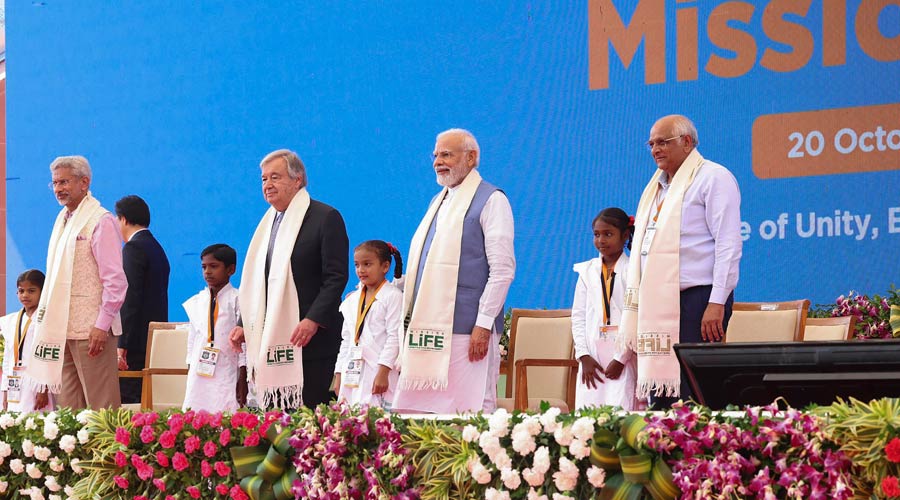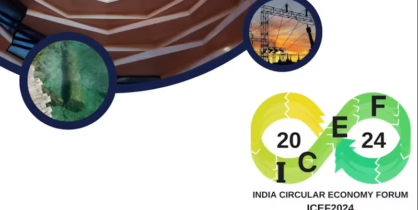Advancing India’s Circular Mission
From “Do No Harm” to “Make a Positive Impact”: India’s Sustainable Journey
Mahatma Gandhi once said, “The Earth has enough for everyone’s need, but not for everyone’s greed.” Rapid industrialisation has strained Earth’s resources, threatening their availability. As highlighted at the Indian Circular Economy Forum on 11th and 12th July 2024 in New Delhi, collective action is essential to adopt sustainable practices, enforce environmental policies, and prioritise responsible consumption.
As the fastest-growing economy and most populous country, India faces significant resource and environmental challenges. Embracing circular economy principles is crucial. India’s Mission LiFE, launched by Prime Minister Modi at COP 26 in 2021, addresses these issues by integrating economic prosperity with environmental conservation and social equity, paving the way for a sustainable and prosperous future for all.

There are 3 phases to Mission LiFE:
- Change in Demand– Nudging individuals across the world to practice simple yet effective environment-friendly actions in their daily lives.
- Change in Supply– Changes in large-scale individual demand are expected to gradually nudge industries and markets to respond and tailor supply and procurement as per the revised demands.
- Change in Policy– By influencing the demand and supply dynamics of India and the world, the long-term vision of Mission LiFE is to trigger shifts in large-scale industrial and government policies that can support both sustainable consumption and production.
Individual Social Responsibility
In India, sustainability is deeply ingrained in cultural norms, where practices like repurposing plastic takeaway boxes and repurposing old clothes for household tasks showcase resourcefulness and waste reduction. These actions not only conserve resources but also minimize environmental impact. As we enter a new era of overconsumption, where we constantly feel the need to upgrade to new cars or smartphones just to stay on trend, it is essential to return to these roots and practice mindful and sustainable consumption. Individual social responsibility plays a crucial role here, where each person can make a significant difference by adopting practices that reduce their ecological footprint. This includes consciously reducing consumption by opting for durable goods, repairing items instead of discarding them prematurely, and supporting businesses that prioritize sustainability. Through these actions, individuals not only contribute to environmental conservation but also inspire others and collectively influence broader societal attitudes and practices towards sustainability.
Principles of Circular Economy
In striving for a circular economy, focusing solely on recycling is insufficient. Emphasizing on the other two R’s—reduce and reuse—is equally crucial. Reduction involves minimising consumption and waste at the source, lessening the demand for new resources. Reuse encourages extending the lifespan of products through repair, refurbishment, or repurposing, reducing the need for new production. By integrating these principles into daily practices, we can effectively close the loop as well as slow it down, fostering a sustainable and resilient economy for the future.
A circular economy is not just about closing the loop, but also about slowing it down to extend the life of products and reduce waste.
Michael Bucki, Head of Department, European External Action Service

The Role of Businesses in Fostering Sustainability
Changes in individual demands are increasingly nudging businesses towards incorporating sustainability into their practices. As consumers become more aware and conscious about environmental and social issues, their preferences are shifting towards products and services that align with their values of sustainability and ethical responsibility. With climate change impacting economic productivity, there’s a growing recognition that integrating sustainable practices in business isn’t merely an expense but a smart investment. This approach enhances efficiency, cuts costs, and reduces risks linked to resource scarcity and environmental harm. Brands play a pivotal role in this transformation by promoting sustainability across their operations.
Businesses need to move on from “do no harm” to “make a positive impact”
Sanjay Khajuria, Director, Corporate Affairs & Sustainability, Nestlé India
This shift involves not just minimizing negative environmental and social footprints but actively seeking opportunities to create beneficial outcomes for communities and ecosystems. By aligning their business strategies with sustainable practices and engaging consumers in responsible consumption choices, businesses can lead the way towards a more resilient and sustainable global economy.
By transitioning from a linear “take-make-dispose” model to a circular economy approach, India aims to close the loop on materials and resources. This involves designing products for longevity, promoting reuse and repair, and maximising recycling to extract maximum value from materials throughout their lifecycle. Such practices not only reduce environmental impact but also contribute to job creation, innovation in sustainable technologies, and enhanced economic competitiveness.
Furthermore, integrating circular economy principles into sectors such as manufacturing, agriculture, and construction can enhance resource productivity, reduce dependency on imports, and build a more resilient economy capable of withstanding global economic fluctuations. It also supports India’s commitments to international climate goals by mitigating greenhouse gas emissions associated with resource extraction, production, and disposal.

In conclusion, India’s Mission LiFE and commitment to a circular economy integrate growth with environmental stewardship. Emphasising on the 3 R’s, India fosters sustainability and individual responsibility. The Indian Circular Economy Forum on 11-12 July 2024 at India Habitat Centre in New Delhi stressed global cooperation, innovative technologies, and shifts in behaviour. As businesses and policymakers adopt sustainable practices, they enhance efficiency and contribute to global climate goals. India’s leadership is crucial for a sustainable future, demonstrating that a circular economy is a smart investment for a thriving planet.


